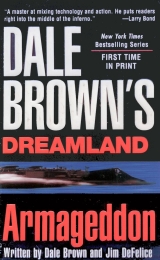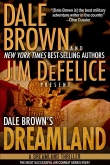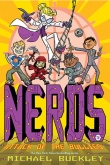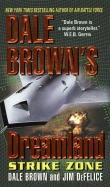
Текст книги "Armageddon"
Автор книги: Dale Brown
Жанр:
Боевики
сообщить о нарушении
Текущая страница: 7 (всего у книги 20 страниц)
III
W ORLD G ONE M AD
Washington, D.C.
10 October 1997, 0700
WHEN HE FIRST READ THE ALERT ON THE MORNING BRIEFING, Jed couldn’t believe it. According to the Associated Press, a lone gunman had shot up a restaurant in the capital of Brunei. Two people had been killed and several more injured, but the casualty list could have been considerably longer if a lucky shot had not severed the wire on the man’s explosive vest.
Terrorists in Brunei? It seemed inconceivable.
It was incredibly inconvenient, since the president was due to announce the sale of three Megafortresses to the kingdom today. Dreamland had already been ordered to have the aircraft ready for delivery within two weeks.
Jed glanced at his watch. It was a bit early to call his boss, but he knew he’d better get some bulletins out on this right away.
Brunei Air Force Headquarters
10 October 1997, 2100
Breanna listened as Mack recounted the incident in the restaurant, and the oddly detached reaction of the government officials afterward.
“So they think he’s just a nutcase?” she said, finally.
“They don’t want to deal with reality,” said Mack. “That kid had a Romanian submachine gun. That’s pretty rare in Brunei.”
“You think he’s tied in with what happened to Zen and me on the beach?”
“Has to be:’ said Mack. “I think there’s a whole network of extremists running around. But as soon as I ask any serious questions, all I get are dumb-ass smiles from my fellow defense ministers.” He said the title as if it were a slur.
“Maybe it’s time for you to get out.”
Mack frowned but said nothing.
“You want me to hang around for a few days longer?” she asked.
Mack shrugged. “Nah. My guys are probably about as up to speed as they’re going to get.”
“Don’t be too hard on them, Mack. They’re not terrible pilots. They just need more flight time. Same with the equipment ops. Deci’ll work with them for a few more days. They’ll get it together.”
“Yeah. The whole country is not very serious about the military here. That’s the problem,” said Mack.
“Well you’re turning it around.” She meant the compliment; Mack was working hard at straightening out the air force—surely harder than she would have thought. “McKenna’s working at it, too.”
“She’s good,” said Mack. “Maybe I ought to send over to Canada for more contract pilots.” He got up. “Listen, Bree, I appreciate everything you’ve done.”
“Don’t mention it,” she told him.
“I’d buy you a drink but I have a pile of things to go through.”
“It’s all right. I have to get up early tomorrow for my flight. It leaves at 4 A.M. If I miss it, I’ll be here until Tuesday”
“You stopping over in Japan?”
She shook her head. “I was thinking of it, but I want to get home”
“Don’t blame you:’ he said, his voice almost wistful.
Dreamland
10 October 1997, 1310
Dog realized that things between him and Jennifer had been derailed for reasons unknown—at least to him. Rather than spending a lot of time analyzing why, he decided to go on the offensive. Big time.
He made sure all of his work was squared away early Friday afternoon, skipping both breakfast and lunch to get his various duties finished. Chief Master Sergeant Terrence “Ax” Gibbs, who functioned as a combination right-hand man and ward healer in the stripped-down Dreamland hierarchy, ran interference for him. He also facilitated the first strike in the operation, helping Dog arrange for a dozen roses to be delivered to Jennifer’s lab first thing in the morning.
The roses sat in a makeshift vase—a sawed-down Coke bottle—on one of the tables near the entrance to the computer lab. As Dog came into the lab, Ray Rubeo had just gotten down on his knees next to Jennifer, seemingly praying over something on the computer.
“You never struck me as the religious type,” said Dog.
“Colonel. Hmmph,” said Rubeo, giving Dog his usual scowl.
“Problem?”
“Just the usual avalanche,” said Rubeo. “We need more personnel, Colonel. I need coders. Real coders.”
Rubeo made a similar plea at least once a week, and usually Dog would cut him off after a few words. But today the colonel let the scientist go on, using the opportunity to watch Jennifer working over the nearby computer. She pounded the directional keys, repeating numbers to herself as she stared at the screen.
Beautiful. Absolutely beautiful.
“So when do we get more personnel?” asked Rubeo finally. “We may be able to get some extra heads as part of the Megafortress program,” Dog told him.
“The Megafortress? Why?”
“Because we’re selling three to Brunei.”
“Piffle,” said the scientist.
“Piffle? In what way?” Dog continued to watch Jennifer, who was absorbed in the screen.
“Piffle in that they’re about as useful to Brunei as a toaster is on the Australian outback,” said Rubeo. “And we shouldn’t even be wasting our resources on the EB-52. The unmanned bomber and satellite stations are much more important—they’re the future, Colonel.”
“Ray, sometimes you’re just too much to take,” said Dog. He looked over at Jennifer, still staring at the screen. “But I love you anyway.”
“More piffle,” said the scientist, muttering to himself as he left the room.
Finally alone, Dog put his hand on Jennifer’s shoulder. “Hey,” he said.
“Mmmmm. “
He ran his fingers along the back of her neck, tickling the light down that grew there. “Come on. You’re taking the rest of the day off. And the weekend.”
“I am?”
“Yes you are. I cleared it with the base commander.”
“Ax?”
“Very funny.”
“And what am I doing with this time off?”
“It’s a surprise,” he said.
“I really have to work.”
“No, as your commanding officer, I order you to take the weekend off.”
“I think that’s a violation of military law.”
“I think you’re right,” said Dog, gently coaxing her to her feet so he could kiss her.
“Do I have to pack?”
“Your suitcase is already in the car.”
JENNIFER LEANED BACK IN THE SEAT AND CLOSED HER EYES, letting the sound of the tires on the pavement soak through her body. The steady hum hypnotized her the way a rocking chair did. Dog was trying, really trying. Roses, a weekend away—she had to admit he was really trying.
Did she still love him?
That was a difficult question, one she couldn’t answer right now.
Maybe Monday.
The car began to slow. Jennifer opened her eyes just as Dog turned off the highway onto a narrow, dusty back road. She had no idea where they were; she wasn’t even sure if it was still in Nevada.
A plane engine roared nearby and a shadow passed over the car. Dog turned left and a trio of small airplane hangars, each not much larger than a garage, appeared across a chained entrance.
“You have a plane here?” she asked.
“Borrowing it from a friend,” said Dog.
“Really? You can fly a light plane?”
He started to laugh and she felt embarrassed, realizing how silly the question was.
“It does take more adjustment than you’d think,” Dog told her. “Not that I’d ever admit it to anyone but you.”
He put the car in gear, driving past the small chain separating the road from the airport lane. He got back out and rechained it—there was something charming in the informality of it all, even if it wasn’t exactly the most secure facility in the world. The small airstrip was all about informality—Dog rolled down the window before driving any further and stuck his head out.
“Have to make sure no one’s trying to land,” he told her.
It wasn’t a joke: just after they crossed the apron to the hangars, a small Cherokee came in, passing within twenty or thirty yards of the car. A short, balding man wearing a grease-stained flannel shirt appeared from the side of the hangar as Dog parked the car.
“Hey, Colonel!” he yelled. “Been waitin’ all day for you”
“Traffic was tough,” said Dog, winking at Jennifer.
“And hello to you,” said the man, bending low to Jennifer. Dog introduced the man as William T. Goat.
“Billy. Get it?” said Goat, who owned the tiny airfield as well as the services connected to it. Goat had been in the air force, working as a maintainer, or aircraft technician. The air operation, land and all, had been in his family for four generations.
“Great-grandfather was a barnstormer,” said Goat, showing them to their plane. “Supposed to have flown under the Brooklyn Bridge upside down”
Goat went over some details of the aircraft quickly with Dog. Jennifer climbed in; within a few minutes Dog had joined her in the cabin, worked through a checklist on a laminated card, and started up the engine.
“You know, I’ve never been in a plane this small,” said Jennifer as they taxied out to the head of the runway—a grand total of forty yards away.
“Nothing to it,” said Dog. “All you do is sit and relax.”
The engine’s growl turned into a loud whine, and the plane bolted forward.
“I think—” she started, but before she could finish the sentence the plane lurched upward. Jennifer felt her lungs bump into her stomach.
“Oh boy,” she said when she finally got her breath back. “Oh boy.”
Off the coast of Brunei
11 October 1997, 0500
The target sat at the lower left-hand corner of the screen. Dazhou Ti stared at the green and black shadows, waiting for the indicator at the center to show they were in range of the missile.
Dazhou had once marveled at the Barracuda’s technology, not simply the propulsion system but the gear that allowed his small crew to run the boat: the global positioning locator, the different screens for passive infrared detection, and the radar receiver, which showed if others were looking for them. The faceted sides of the vessel made it as difficult to see on radar as its low-slung profile and black paint made it hard to spot with the naked eye. The passive detectors and burst radar targeting system allowed them to operate nearly invisibly, minimizing the electronic signals that indicated a conventional warship’s presence as surely as a searchlight on an otherwise darkened deck. But now, barely six weeks since his first trial voyage, Dazhou took it all for granted.
“Captain, we are within range,” said the weapons officer. “Speed stablilizing at eighty knots.”
“Prepare the missiles.”
The weapons officer touched two buttons on his panel. The metal grate below Dazhou’s feet vibrated as the hatchway above the missile launcher separated. Information on the target—a large oil tank at the center of a tank farm near Muara on the northern coast of Brunei—was downloaded into the guidance system of the missile.
“Missile ready,” replied the crewman.
“Fire,” said Dazhou.
There was a snarl on the rear area of the Barracuda as the Exocet took off. The French-made anti-ship missile accelerated upward, approaching the speed of sound. After a few seconds, its nose tilted slightly downward and it began skimming along the waves, making it very difficult to track, let alone intercept. When it came within ten kilometers it would activate its own radar and use it to close in on the tank.
“On course,” reported the weapons officer, tracking the missile’s progress.
“Unknown contact bearing one-zero-eight, at thirty kilometers, making ten knots,” said the radarman. “Appears to be a patrol vessel. Brunei. One of their new Russian craft. Not close enough for positive identification.”
“Does it see us?”
“Negative.”
Dazhou was tempted to destroy the patrol ship, one of two recently purchased by the sultan to equip his paltry navy. But his orders from the general were to avoid engagements if possible. Striking the patrol ship, as tempting as it might be, might prematurely alert the enemy to the existence of his ship.
Turning back now meant there would be no chance of seeing the fire his missile would cause. But vanity was not among Dazhou’s weaknesses. The more difficult decision involved whether to proceed away at high speed or not. Taking the turn at high speed involved a tilt maneuver that made the craft visible by sophisticated radars, including the one aboard the Brunei ship. A slow turn, which for the Barracuda meant roughly twenty knots or a little less, kept the ship’s profile low in the water and almost surely invisible. But dropping the speed to turn would mean he’d lose the flight effect; he would be turning the Barracuda back into a “normal” ship. Not only would he lose his momentum, but he would have to wait until he was a good distance from the Brunei ships to pop up. The “takeoff regime”—the word they used for initiating the effect—could not be made radar efficient. And besides, achieving the thrust necessary taxed the cooling capabilities of the ceramic baffles at the rear; he would be visible on infrared. Dazhou had to decide: remain unseen but go slow, thereby increasing the length of the mission, or go fast and hope the men on the Brunei ship didn’t believe their sensors.
Throughout his career, he had taken the risky path, preferring its quick rewards. But there were no rewards in this case; he wanted to keep the ship secret for as long as possible.
“Rig for full stealth mode,” he told his crew. “Return to base as planned. Remain on passive detectors only.” The men moved silently to comply.
Brunei
11 October 1997, 0530
Mack Smith groaned as the phone rang, then reached over to the side of the bed and picked up the receiver.
“Yeah?” he said.
“Mack, McKenna. We got some sort of terrorist thing going over at Muara. Looks like the navy’s screwing everything up. You want me to get the Dragonflies up?”
“Hold on a second.” Mack pulled himself upright, trying to will himself back to full consciousness. He hadn’t had more than four hours of sleep in weeks. “What exactly is going on?”
“Terrorists attacked a tank farm out near Muara, where petrol is stored before it’s picked up by tankers,” said McKenna. “Navy has a patrol boat in the area but they’re coming up empty. I want to launch Dragonflies to patrol the area.”
“What sort of attack?”
“I don’t have all the details yet. May have been some sort of missile or mortar rounds.”
“Missile? From terrorists? More likely they snuck in there and planted a bomb.”
“Could be. Should we get up in the air or not?”
“We have fuel?”
“We have fuel.”
“All right. Send up a two-plane patrol and have another stand by. You lead the first flight; report in when you know the situation. Get the Megafortress ready.”
“Done and done,” said McKenna.
“I may marry you yet, McKenna.”
For the first time since they’d met, she didn’t have a snappy comeback. “Coffee’ll be waiting at the hangar,” she said.
AS HE GOT DRESSED, MACK DECIDED HE WOULD TAKE Breanna up on her offer to hang around for a few more days; he could use an aggressive pilot in the cockpit of the EB-52. Then he realized that her flight home would have left an hour ago.
So he decided he’d take the plane up himself.
While Mack respected the capabilities of the EB-52, he’d never been particularly enamored with the plane. Early on during his stay at Dreamland, he had gone through the familiarization courses and did well enough to have been offered a pilot’s slot in the program. But for all the sleek modifications and sophisticated upgrades, the big jet was still a big jet, a lumbering bomb truck, a B-52. Mack Smith flew pointy-nose go-fast jets, not big ugly fat fellas.
But you did what you had to do. By the time he got to the airport, the ground crew was fueling the plane. Mack stopped at the tower where his ground operations center was coordinating mission information and getting updates from the other services. McKenna’s flight had taken off twenty minutes before and was patrolling over the tank farm, twenty miles away. Meanwhile, other guerilla attacks were reported on the outskirts of the capital.
Security at the airport was primarily provided by the army, but Mack had a small force of his own soldiers; after checking over at the hangar to make sure the Megafortress was nearly ready to go, he turned his attention to his ground force. He saw the apprehension in their eyes when he told them they were authorized to shoot to kill.
“But that won’t be necessary, Mr. Minister,” said the captain in charge of the detail, trying to reassure the men.
“It damn well may be necessary,” said Mack. “Anyone comes up to that gate and doesn’t stop when you challenge them, you shoot them. Make sure we have patrols around the whole perimeter, and double-check with the army. Tell them this is serious shit. Got me?”
The captain looked as if he had swallowed his lips. Mack looked at his soldiers—all eight of them, none older than twenty-three. They were well trained, thanks largely to the British, who had supplied instructors from the Special Air Service or SAS, the British inspiration for America’s Delta Force. Still, these were kids who had never had to fire their weapons in anger before; there was no telling how they would do until things were really on the line. Mack sensed that he should tell them something, leave them on a high note. Colonel Bastian did that sort of thing all the time, not so much with a speech but with his voice. Mack tried it now, making himself sound a hell of a lot more confident than he felt.
“Your job is to keep this place safe,” he said. “I’m counting on you.”
“Yes, sir,” said the captain.
“Good,” said Mack. He snapped off a salute, then walked back toward the hangar, wishing he could have come up with something more eloquent.
The Megafortress crew had arrived at the hangar and was suiting up. Mack called the two pilots over and told them he was coming aboard as commander and would fly, but both men were needed in the aircraft. The scheduled pilot looked relieved—which bothered Mack quite a bit, since in his mind that meant the man wasn’t aggressive enough. He himself would have thrown a fit if he were replaced, even by Dog himself.
Mack got his gear and went to check with the acting head of the ground crew. They were just topping off the tanks, moving a little awkwardly, both because of the hour and the fact that the plane and its systems were still unfamiliar. Mack longed for the snap of the air force’s Dreamland maintainers—God protect the airman, let alone a sergeant, who wasn’t in exactly the right place when Chief Master Sergeant “Greasy Hands” Parsons was scrambling to get one of his aircraft ready. But you didn’t really appreciate the job Chief Parsons and his people did until they weren’t there to do it.
Mack went over to the crew with the idea of telling them to move faster. As he approached, a look of horror spread over the face of the sergeant supervising the fueling operation.
Yelling at the man wasn’t going to get the job done any faster or better, Mack realized as he opened his mouth. Once more, Dog popped into his head as a model. He changed his message to something he hoped was encouraging—”Let’s do it, boys”—and gave them a thumbs-up.
Whether that worked or not, Mack couldn’t tell. He walked under the big aircraft and went up the fold-down steps into the belly, landing on the stripped-out Flighthawk deck. Then he climbed up to the flight deck, where he was surprised to find Deci Gordon, the Dreamland radar expert, at one of the operator stations.
“Deci, you coming with us?” said Mack.
“Figured you’d want me to.”
“Yeah,” said Mack. He started toward the pilot’s seat, then stopped, realizing from Deci’s frown that he’d somehow managed to say the wrong thing.
How would Colonel Bastian handle it? Mack asked himself.
Just like that, or even simpler, with a nod. But somehow, what worked for Bastian didn’t work for Mack. Mack turned and saw Deci frowning at him.
“Listen, I’d appreciate it if you came with us,” said Mack. “I really would.”
Deci looked at him, as if expecting a trick. Not sure what else to do, Mack nodded and climbed into the pilot’s seat.
They were off the runway in twenty minutes, which would have been a decent time for a scrambling Dreamland crew, Mack thought. McKenna checked in a few minutes after Mack cleaned the landing gear and began a wide patrol orbit, climbing up through fifteen thousand feet, en route to thirty-five thousand.
“Dragon One to Jersey,” said McKenna. “We came up negative on our search. No speedboat, no nothing.”
“Roger that,” said Mack. His patrol circuit took him over the ocean; Deci and the radar operator handling the surface contacts ID’d a freighter approaching from the west about ten miles away; it was the only sizeable ship except for Brunei coastal patrols in the area.
“Say, Mack, I think I have the Sukhoi again,” said Deci. “Planes we picked up the other day. Coming up toward the coast.”
“Feed me a vector,” said Mack.
San Francisco
10 October 1997, 1810
Dog had planned it all out so well that the cab was just pulling up to the flight service building as he shut down the aircraft after their flight from Nevada. They got in, and arrived just in time for their reservation at Il Cenacolo, an Italian restaurant a few miles northwest of the city, which Jennifer had mentioned once during a date. The host greeted them by name; Jennifer seemed to float across the room, and Dog thought to himself that things could not be going more perfectly.
It was at that moment that he heard the voice from across the room.
“Tecumseh Bastian, what are you doing in San Francisco?”
He closed his eyes, but he knew it was useless. His ex-wife had somehow managed to ruin the one perfect romantic moment of his life.
“Karen, how are you?” said Dog, turning in the direction of the voice.
Dr. Karen Melenger was sitting with three other women at a table near the side of the room. She rose, came over, and made a show of kissing his cheek. Dog stepped back and, with as much politeness as he could muster, introduced Jennifer.
“Your girlfriend?” said Karen. She held out her hand as if she were the Queen Mother and expected it to be kissed.
Dog thought he saw a smirk in the corner of Jennifer’s mouth. She said hello, declining the handshake without calling attention to it, and said how nice it was to meet a person Dog spoke so highly of.
It was a remarkably smooth lie, thought Dog, and even Karen seemed taken in. But Jennifer then made the mistake of suggesting that they all get together for a drink sometime.
Dog cringed, knowing Karen would accept—sooner, rather than later.
“Tomorrow night would be perfect,” she said. “The convention ends in the afternoon, but I’m not flying back to Las Vegas until Sunday afternoon”
“How lucky,” said Dog, nudging Jennifer away.
“Where are you staying?” Karen asked.
“At a hotel,” said Dog. “We’ll call you.”
“We’ll I’m at the Max,” said Karen. It was naturally one of the most expensive hotels in the area. “You won’t forget?”
“No.”
“Jennifer, make sure he doesn’t forget.”
“Tecumseh is definitely responsible for his own actions.”
“Yes, he is, isn’t he?” said Karen.
Brunei
11 October 1997, 1013
“They’re still over Malaysian territory,” Deci told Mack as he turned the Megafortress in the direction of the Sukhois. “No indication they see us. Range is one hundred and fifty miles. They’re doing about five hundred knots, still at twenty-two thousand and twenty thousand feet, respectively.”
“You have that on your screen, Jalan?” Mack asked the copilot.
“Yes, sir.”
“All right. What we’re going to do is run as close to them as we can but still stay over Brunei territory. It’s going to take us one loop down at the south before they’re in range to pick us up”
“You want them to pick us up?” asked Jalan.
“I want them to attack us,” said Mack.
“You think they’ll attack?” Jalan didn’t sound worried so much as surprised.
“Probably not,” said Mack. ‘But if they do, we want to be ready for them. And if they come over our border, we’ll have justification to follow them. I’d like to find out for sure where they’re operating from.”
“Yes, sir.”
One thing in Jalan’s favor, thought Mack: he didn’t point out that the only weapon the Meagfortress carried was the Stinger air-mine dispenser in the tail, which was designed to work against pursuing aircraft at close range.
“Be ready with the ECMs if we get close,” Mack told his copilot. The ECMs disrupted the guidance systems of enemy missiles, rendering them useless. “The computer can blind that sucker and any missile he’s carrying, don’t worry. These planes have done it a dozen times. It knows those avionics systems better than we know our names”
“Yes, sir.”
If the Sukhois were operating from the base Mack had seen on the satellite images, he’d have to fly fairly far from Brunei territory to get the proof he wanted. It was a calculated risk, given that he didn’t know whether or not there might be more aircraft. But he would have to take some risks to find out what the Sukhois were up to; ignorance was much more dangerous in the long run.
Mack checked back with his controller at the airport to see what the situation was. The controller had double-checked with the spy network to find out if there had been activity at any of the other airfields on Borneo; a few helicopters were missing from Kuching in the southwest, but otherwise the situation seemed to be status quo.
The situation with the terrorists, however, was anything but. The Royal Brunei Police Force now reported several disturbances and attacks throughout the kingdom; Mack told the liaison officer to call over to the headquarters and see if any of the units needed assistance.
“Already have. They’ve declined.”
“Call the regional offices, as well,” said Mack. “Let’s see if they have a different opinion.”
“Yes, sir, Mr. Minister.”
The Brunei border ran parallel to his flight path about five miles off his left wing; it extended only about fifty miles south. Doing roughly four hundred knots, they would have to turn in six or seven minutes if they were going to stay over their part of the island.
“Sukhois are changing course, Mack,” said Deci.
“Where are they going?”
“Not clear at the moment. Heading …” Deci hesitated. “They’re coming west, picking up speed, uh, angling down a bit.”
The Sukhois had made a sharp left turn and started to descend from twenty thousand feet. The two Malaysian planes were now flying a course that would take them directly over the border. According to Deci, they hadn’t seen the Megafortress—they were not using their radars, a sign to Mack that they didn’t want to be detected. They had also selected their afterburners for a burst of speed as they dropped down closer to the mountain tops.
“Setting up for a bombing raid?” Mack asked Deci.
“Too soon to tell.”
“Get on with the liaison and have him send an alert.”
“Got it.”
Mack continued southward for another minute and a half, trying to visualize what the Malaysian jets were up to. They continued to descend, passing through seventeen thousand feet en route to sixteen; it wasn’t a rapid descent but by the same token they showed no sign of leveling off. They’d backed off the afterburners but were still moving very quickly, up around five hundred and fifty knots.
“There guerilla camps in that direction?” Mack asked. He meant the question for Deci but Jalan answered.
“There are guerillas along the mountain sides, yes, Minister, but on the south side, not north,” said the copilot.
“One thing I’d point out, this model Su-27 ordinarily wouldn’t be carrying air-to-ground weapons,” said Deci.
“Yeah,” said Mack. The early Su-27s were intended primarily as interceptors, but they did have some capability to drop bombs, and in any event might have been upgraded to do so. “You talk to ground?”
“Passed it along. Entire army is already on alert.”
“Minister, two helicopters approaching Brunei territory southwest of Labi,” said one of his operators. It was the first time the crewmen had called out a contact on their own.
“Good work,” said Mack. He clicked into McKenna’s frequency. “Yo, Dragon One, I got a job for you. Stand by for a brief.”
MCKENNA ACKNOWLEDGED THE INFORMATION ABOUT THE helicopters and snapped onto the new course, her hand slapping the throttle to full military power. Her wingman, Captain Yayasan, acknowledged tersely when she called over to make sure he was following along.
“Pedal to the metal,” she told him. “Look sharp, eh?”
“Yes, ma’am.”
The Bruneians didn’t particularly like taking orders from women, and McKenna could hear the resentment in her wing-man’s voice.
Have to kick his butt when we get down, she thought to herself.
“Make sure your cannon is ready and keep your head in the game,” she told Yayasan. Not expecting a response, McKenna leaned forward against her restraints, urging the A-37B to get a move on. At roughly one hundred miles away, it would take just under eight minutes for them to get there. By then it might be too late.
THE SUKHOIS TOOK ANOTHER SHARP TURN TO THE northwest, now at five thousand feet over the Limbang River Valley. They were still over Malaysian territory.
“I think they’re aiming for one of the guerilla camps at the southwest side of the river,” said Deci.
“What do we have near there?” Mack asked.
“Police barracks on the other side of the border,” said Jalan.
Mack punched up the map on his left-hand display screen, studying the border area. He was just over three minutes away.
“Deci, can we jam the Sukhois?”
“Uh, you mean screw up their bombs with ECMs?”
“Exactly”
“No way. Unless it’s an air-to-ground missile working off a GPS system, and even then it’d have an internal backup.”
“Then I guess we’ll just have to get in their faces,” said Mack.
“Minister, are you sure they’re going to attack our barracks?” asked Jalan.
“Not at all,” said Mack. “But I don’t intend on giving them the chance”
He reached to the throttle slide at the side of his seat, coaxing more power from the EB-52’s four engines.
“It’s going to get a bit twisty at the end:’ he told his crew. ‘The pilot has put on the no-smoking sign. Please fasten your seatbelts. Remember to keep your hands inside the car at all times.”
He pitched the plane onto her wing, sliding down in a three-dimensional pirouette as he got the Megafortress’s nose turned toward the border post. The EB-52 growled at him as the G-forces shot up exponentially, but it complied nonetheless, speed increasing as he dove down toward the border. The copilot began reading off the altitude as the altimeter ladder revolved downward. Meanwhile, the Sukhois had not altered course.
“Try getting them on the radio,” Mack told Jalan. “Tell them they better not go over the border.”








